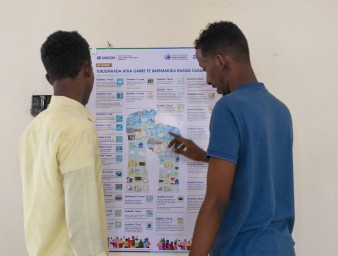Valued milestones amidst persistent crises – UN Human Rights’ 2023 results
13 June 2024

Despite being a milestone year, during which the world celebrated the 75th anniversary of the Universal Declaration of Human Rights, 2023 was also a year of multiple human rights crises, said UN Human Rights Chief, Volker Türk, while presenting his office’s Report for 2023.
UN Human Rights staff around the world – 1,963 people across 95 presences worldwide – continued to work to face “the triple planetary crisis, shocking inequalities, corrosive polarization, the increasing risks posed by the ungoverned frontiers of digital technology, and a merciless wave of new and worsening conflicts,” he added.
The report covers Türk’s first full year in office and highlights the progress made by UN Human Rights towards results the office committed to achieve by the end of last year against the targets set out in the OHCHR Management Plan 2018-2021 that was extended through 2023.
Achievements in 2023
- Strengthening the rule of law and accountability for human rights violations.
- Preventing violations and strengthening human rights protection, including in conflict and insecurity situations.
- Increasing the implementation of the recommendations by international human rights mechanisms.
- Continuing to enhance equality and non-discrimination for everyone.
- Advancing sustainable development.
- Advancing our Organizational Effectiveness Actions Plans.
In 2023, UN Human Rights’ advocacy to strengthen the rule of law and accountability for human rights violations contributed to the release of over 13,000 detainees, including following the monitoring visits of 1,801 places of detention. The Office’s two humanitarian funds provided assistance and rehabilitation support to 59,500 survivors of torture and 12,100 survivors of contemporary forms of slavery.
In Somalia, the Office’s work to prevent violations and strengthen the protection of human rights resulted in the endorsement of the Age Assessment Guidelines and its Standardized checklist and in Iraq, the signature of the Action Plan for prevention of the recruitment and use of children by the Popular Mobilization Forces.
UN Human Rights also contributed to increasing the implementation of the outcomes of the international human rights mechanisms. Following recommendations by the international human rights mechanisms and with UN Human Rights’ support, Ghana adopted a new bill abolishing the death penalty; the Republic of Moldova developed a new National Human Rights Programme 2024-2027; and the Dominican Republic adopted the National Policy to Mainstream Human Rights. Further, 2023 saw 16 additional ratifications or accessions to human rights instruments, bringing the total to 120 for 2018-2023.
Our continued efforts to enhance equality and non-discrimination for all resulted in the adoption of the Persons with Disability Bill in Botswana, and of the programme to support the housing of persons with disabilities in Mongolia, that now enables the inclusion of people with disabilities and their families in housing projects managed by the Government, thus improving their living conditions and quality of life.
UN Human Rights also supported efforts to advance sustainable development in Burundi where the National Strategy for the Socio-Economic Inclusion of the Batwa 2023-2027 was adopted, enabling the Batwa Indigenous People to benefit from interventions to address their dire economic and social conditions. Further, in Mexico, in the State of Zacatecas, several years of technical support by the Office contributed to reaching an agreement for comprehensive reparation measures specific to each family affected by a mining company’s activities.
The Office also made progress in advancing its Organizational Effectiveness Actions Plans. Changes to internal work processes and operating systems enhanced UN Human Rights’ operational relevance and efficiency and improved the delivery of its programmes. For example, the use of AI to automatically process open-source information bettered the Office’s capacity to gather information, leading to an increase of the number of leads on attacks on human rights defenders from an average several hundred per year to 450 a day.
“
Crises often stem from a failure to protect our human rights. And human rights provide a blueprint for alternatives.
“
Volker Türk, UN High Commissioner for Human Rights
UN Human Rights’ results would not have been possible without the funding provided by its partners, Türk said. In 2023, some USD 281.5 million reached the Office through voluntary contributions from 71 States and several other partners, the highest amount ever received. That funding, however, represented a shortfall of USD 170.9 million additional needed to meet the Office’s appeal requirements.
“The breadth of our mandate, coupled with intensifying human rights challenges, leaves us still significantly under-resourced,” Türk pointed out. “Achieving our 2024 appeal target of US$ 500 million would be a gamechanger in our efforts to work with States, civil society, communities, and many other partners, to deliver on the promise of human rights for people everywhere.”
At the beginning of 2024, Türk issued his vision statement, entitled “Human Rights: A Path for Solutions,” that was informed by the engagement he had with diverse actors throughout his Human Rights 75 Initiative. The recommendations he made in that document also informed UN Human Rights’ management plan (OMP) for 2024-2027, due to be released on 8 July.



